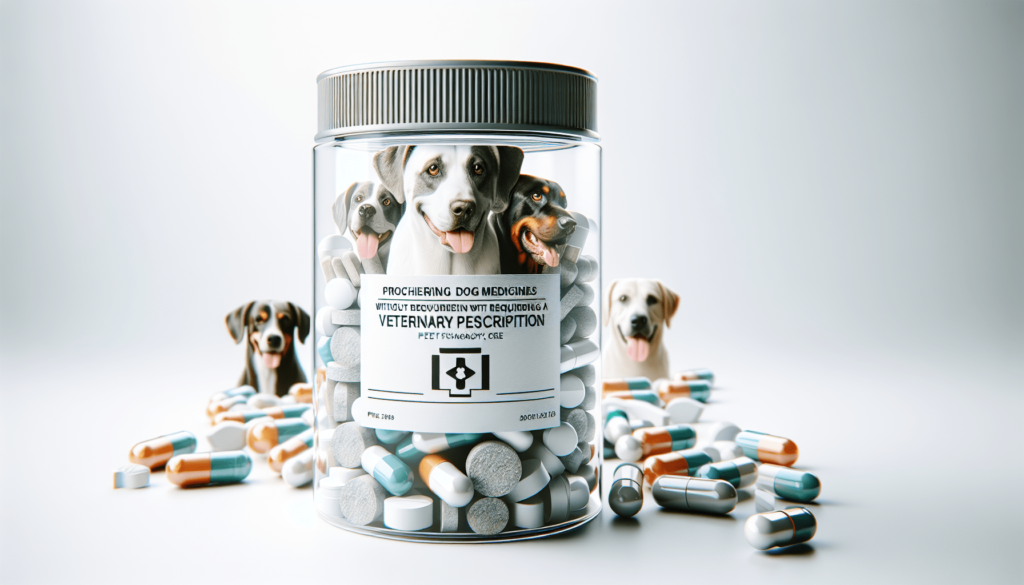
In the world of pet care, it’s crucial to prioritize the well-being of our furry friends. As responsible pet owners, we have the power to make informed decisions about their healthcare. While the idea of bypassing a vet prescription for pet medications may seem tempting, it’s essential to remember the potential risks involved. By working closely with a trusted veterinarian, we can ensure that our beloved dogs receive the best possible care, leading to a healthy and happy life by our side. After all, our pets rely on us to make the right choices for their overall well-being.

Importance of Veterinary Prescription
When it comes to your pet’s health, ensuring proper diagnosis and treatment is crucial. Veterinary prescriptions play a vital role in this process by providing you with the necessary guidance and expertise. Let’s delve into the reasons why veterinary prescriptions are of utmost importance.
Ensuring Proper Diagnosis
The first and foremost benefit of veterinary prescriptions is the assurance of a proper diagnosis. Veterinarians are trained professionals who can accurately identify and treat various medical conditions in pets. By consulting a veterinarian and obtaining a prescription, you can rest assured that your beloved furry friend will receive the appropriate treatment based on their specific condition.
Appropriate Dosage
Another crucial aspect of veterinary prescriptions is ensuring the correct dosage of medication for your pet. Veterinarians carefully calculate the appropriate dosage based on your pet’s weight, size, and specific medical needs. This personalized approach helps to prevent both underdosing and overdosing, ensuring that your pet receives the optimal amount of medication for effective treatment.
Avoiding Unnecessary Risks
Obtaining pet medications without a veterinary prescription poses significant risks to your pet’s health. Without proper diagnosis and guidance from a professional, the chances of ineffective treatment or even exacerbating the underlying condition increase. By relying on veterinary prescriptions, you can minimize these risks and provide the best possible care for your pet.
Risks of Obtaining Pet Meds Without Prescription
While it may be tempting to try and find alternative ways to obtain pet medications, there are several risks associated with doing so. It’s essential to understand these risks and why veterinary prescriptions are the safest and most reliable option.
Unsafe Products
One of the primary risks of obtaining pet medications without a prescription is the possibility of purchasing unsafe products. Without the oversight of a veterinarian, there is no guarantee that the medications you obtain are of high quality or properly regulated. Unsafe products may contain harmful ingredients or be expired, posing a serious threat to your pet’s health.
Inaccurate Dosage
Without a veterinary prescription, determining the correct dosage for your pet can be challenging. Inaccurate dosing can lead to ineffective treatment and potential harm. Veterinarians take various factors into account, such as your pet’s weight, age, and medical history, to prescribe the precise dosage needed for optimal results. It is crucial to avoid the guesswork and rely on the expertise of a veterinarian.
Undiagnosed Medical Conditions
Purchasing pet medications without a prescription may mask underlying medical conditions that require proper diagnosis and treatment. Veterinarians utilize their knowledge and expertise to identify any potential health issues your pet may have and prescribe medications accordingly. By bypassing veterinary consultations, you risk overlooking crucial medical conditions that could worsen over time if left untreated.
Legal Restrictions on Prescription Medications
Understanding the legal restrictions surrounding prescription medications is vital to ensure compliance and protect both your pet’s well-being and your own interests. Let’s explore the regulatory aspects and legal consequences associated with obtaining pet medications without a prescription.
Regulatory Authorities
Prescription medications for pets, just like those for humans, are regulated by government agencies such as the Food and Drug Administration (FDA). These regulatory authorities set standards for the safety, efficacy, and quality of medications. The oversight provided by these organizations helps to ensure that the products you use for your pet meet stringent standards.
Consequences of Violating Regulations
Obtaining prescription medications without a veterinary prescription can result in severe consequences, both legally and ethically. Violating regulations can lead to fines, legal penalties, and even criminal charges. Additionally, using such medications may compromise your pet’s health and well-being. It is crucial to respect and adhere to the laws and regulations in place to protect both your pet and yourself.
Legal Penalties
The penalties for obtaining pet medications without a prescription can vary depending on the jurisdiction and severity of the offense. In some cases, individuals may face fines, license revocation (for veterinarians), or even imprisonment. It is essential to understand that these penalties exist to maintain the integrity of the veterinary profession and to prioritize the well-being of animals.
Legal Ways to Obtain Pet Medications
While it is clear that obtaining pet medications without a prescription is risky and unlawful, there are legal avenues to ensure your pet’s health needs are met. By following these legitimate methods, you can obtain the necessary medications while maintaining compliance with relevant regulations.
Consulting a Veterinarian
The most reliable and recommended method to obtain pet medications is by consulting a veterinarian. Veterinarians have the necessary knowledge and expertise to diagnose your pet accurately and prescribe the most appropriate medications. By building a relationship with a trusted veterinarian, you can ensure that your pet’s health needs are continually met through legal means.
Prescription Transfers
If you require a prescription refill or wish to change veterinarians, prescription transfers offer a legal and straightforward solution. Many veterinary clinics are open to transferring prescriptions as long as certain requirements are fulfilled. This allows you to maintain continuity in your pet’s treatment plan while adhering to the necessary legal procedures.
Online Pharmacies
Legal online pharmacies that require a veterinary prescription are a convenient option for obtaining pet medications. These pharmacies operate in compliance with the law and often provide a wide range of medications for various pet health conditions. When purchasing medications online, it is crucial to ensure that the pharmacy is reputable and adheres to all regulatory guidelines.

Working Closely with a Veterinarian
By working closely with a veterinarian, you can ensure that your pet receives the best possible care and attention to their specific needs. Maintaining regular check-ups, open communication, and follow-up examinations are vital components of this collaborative relationship.
Regular Check-ups
Regular check-ups with a veterinarian are essential for monitoring your pet’s overall health and identifying any potential issues before they become more severe. These routine examinations allow veterinarians to perform thorough physical assessments, recommend preventative measures, and address any concerns you may have about your pet’s well-being.
Open Communication
Effective communication between you and your veterinarian is key to providing your pet with the best care. Be sure to discuss any changes in your pet’s behavior, eating habits, or overall demeanor. Sharing these details can help your veterinarian gain valuable insights and make informed decisions regarding your pet’s treatment.
Follow-up Examinations
Follow-up examinations are crucial to assess the effectiveness of prescribed medications and monitor your pet’s progress. These examinations allow veterinarians to make any necessary adjustments to the treatment plan and ensure that your pet is responding positively. Regular follow-up examinations foster a cooperative approach to your pet’s healthcare and contribute to their overall well-being.
Benefits of Veterinary Consultation
Choosing to consult a veterinarian for your pet’s healthcare needs brings numerous benefits. From customized treatment plans to early detection of issues, veterinary consultation plays a vital role in maintaining your pet’s health.
Customized Treatment Plans
Every pet is unique and requires personalized care. Veterinary consultations enable veterinarians to design treatment plans tailored to your pet’s specific needs. This customized approach ensures that your pet receives the most effective and appropriate medications for their condition, leading to optimal health outcomes.
Monitoring Medications
Veterinary consultations allow for ongoing monitoring of your pet’s medications. Regular check-ups and open communication provide opportunities for veterinarians to track your pet’s progress, assess the effectiveness of medications, and adjust dosages if necessary. This ensures that your pet’s treatment plan remains up to date and in line with their evolving health needs.
Early Detection of Issues
Regular veterinary consultations increase the chances of early detection of any underlying health issues your pet may have. Through physical examinations, laboratory tests, and a comprehensive understanding of your pet’s medical history, veterinarians can identify potential problems before they worsen. Early detection allows for prompt intervention and increases the likelihood of successful treatment outcomes for your pet.
Ensuring Quality and Safety
When it comes to your pet’s medications, quality and safety should always be a top priority. Understanding how to ensure the quality and safety of the medications you administer to your pet is essential for their well-being.
FDA-Approved Products
Opting for FDA-approved medications ensures that your pet receives medications that meet rigorous safety and quality standards. The FDA evaluates medications for their safety, efficacy, and manufacturing standards, providing you with the assurance that the products you use are reliable and well-regulated. Always look for FDA approval when purchasing pet medications.
Proper Storage and Handling
Proper storage and handling of pet medications are essential to maintain their effectiveness and safety. Follow the guidelines provided by the manufacturer or your veterinarian regarding storage temperature, light exposure, and expiration dates. Incorrect storage can compromise the medication’s potency or even render it unsafe for use.
Avoiding Counterfeit Medications
The risk of counterfeit medications exists, even in the veterinary world. By obtaining medications through legal channels, such as veterinary prescriptions or reputable online pharmacies, you can minimize the risk of counterfeit products. Counterfeit medications often lack the necessary quality controls and may fail to provide the intended therapeutic effects, compromising your pet’s health.
Alternative Solutions for Pet Health
While veterinary consultations and prescribed medications are essential, there are alternative approaches to pet health that you may consider alongside traditional treatments. These alternative solutions may complement your pet’s overall well-being and contribute to their health in different ways.
Natural and Holistic Approaches
Natural and holistic approaches to pet health focus on maintaining overall wellness and preventing health issues through lifestyle changes, nutrition, and natural remedies. These approaches often place emphasis on proactive care and aim to support your pet’s physical and emotional well-being. Consulting with a veterinarian experienced in integrative medicine can help you explore these alternative options.
Lifestyle Changes
Making certain lifestyle changes can significantly impact your pet’s health. Incorporating regular exercise routines, providing a balanced diet, and ensuring proper grooming practices are all beneficial to your pet’s overall well-being. Consulting with a veterinarian can help you identify specific lifestyle changes that may contribute positively to your pet’s health and happiness.
Supplements and Dietary Modifications
Supplements and dietary modifications can play a supportive role in your pet’s health. Specific supplements, such as omega-3 fatty acids or joint support supplements, may help address particular health concerns. Consulting with a veterinarian will help determine which supplements, if any, are suitable for your pet and their specific needs.
Emergency Situations and First Aid
In the event of an emergency, knowing how to recognize symptoms and provide basic first aid to your pet can be lifesaving. While immediate veterinary care should always be sought in emergencies, understanding basic first aid techniques can help stabilize your pet’s condition before professional help arrives.
Recognizing Symptoms
Being able to recognize symptoms of a potential emergency is crucial for prompt intervention. Common symptoms may include difficulty breathing, severe bleeding, seizures, sudden lethargy, or loss of consciousness. Familiarize yourself with the signs of potential emergencies to ensure timely response and appropriate action.
Basic First Aid Techniques
Basic first aid techniques, such as controlling bleeding, performing CPR (cardiopulmonary resuscitation), or treating minor wounds, are valuable skills to have as a pet owner. Enrolling in a pet first aid and CPR course or consulting with your veterinarian can help you learn and practice these essential techniques.
Emergency Vet Care
While basic first aid techniques can provide temporary stabilization, it is essential to seek immediate veterinary care in emergency situations. Veterinary professionals have the expertise, equipment, and resources necessary to diagnose and treat emergencies effectively. Remember, prompt veterinary care is crucial for your pet’s well-being in emergency situations.
Conclusion
Taking responsibility for your pet’s health is a paramount duty. By consulting a veterinarian, obtaining medications through legal means, and remaining proactive in your pet’s healthcare, you ensure their well-being and happiness. Trusting in veterinary expertise, maintaining open communication, and staying up to date with their healthcare needs will help you provide the best possible care for your furry companion. Together, you and your dedicated veterinarian can ensure that your pet leads a happy, healthy life by your side.










